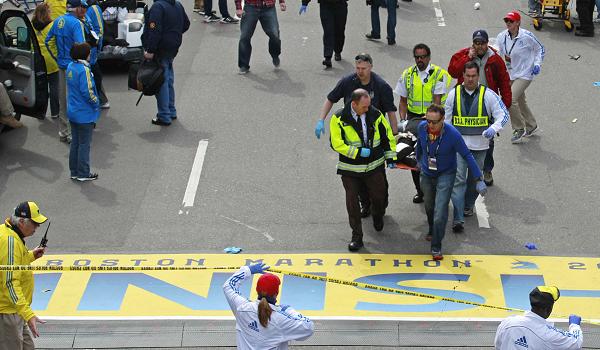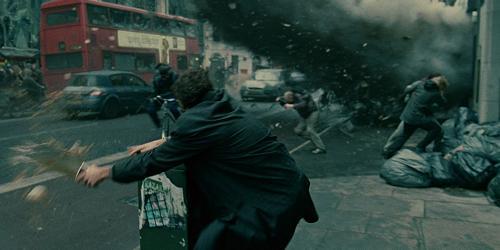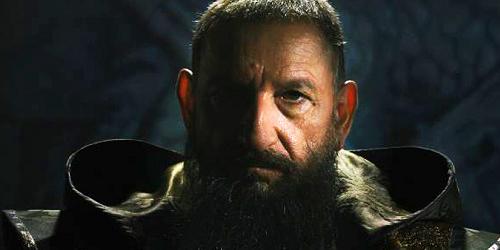
It’s the start of a normal working day. People mill about on the streets and in cafes, procuring the tonics they need to begin their mornings in earnest and setting off on their commutes to make it to the office; in the space between these separate but related endeavors, they catch up on current events on television. The news, as it so often can be, sings a dour note to match the day’s cloudiness, but that’s okay, because bleakness and dreariness are the tragic standard for the crowds filtering through the city’s winding, compressed avenues on their way to their respective jobs.
A thundering crash, the acrid scent of burning buildings, and the screams of the wounded cut through that morose reverie, and that sense of the habitual changes drastically. Passerby might not even be completely cognizant of what has just happened; maybe it’s the sound of a coming storm, or perhaps a minor car accident, or an incident on a construction site. But none of those events reduce a humming coffee shop to rubble or produce billowing columns of pitch-black smoke, nor do they send scores of pedestrians scrambling away in sheer, unrepentant fear. One man spills his drink the moment the explosion occurs, and looking to its point of origination, he spots a woman stumbling out onto the street holding her own severed arm.
What I am describing here is not a morbid re-interpretation of the gruesome scene that unfolded this past Monday in Boston, when bombs detonated at the finish line of the Boston Marathon and left three people dead and over one hundred others injured. It’s the opening two minutes of Alfonso Cuaron’s Children of Men, the director’s brilliant 2006 dystopian science fiction film, which starts off with a deadly, explosive attack on a storefront filled with civilians going about their business on a weekday like any other. Cuaron does not linger on that final image before cutting to opening credits, but he doesn’t have to- it sticks with us by virtue of being horrifying rather than gratuitous.
Somebody out there might be willing to describe the coverage of Monday’s tragedy in precisely those terms- it certainly won’t be me- but Children of Men perfectly encapsulates in a minute period of time the utter panic that follows in the immediate wake of such brutal, unexpected, mass-scale violence. Confusion defines the moment; nobody’s sure what happened or why. Instead, they’re only aware that something outside the realm of normalcy, something unspeakably terrible, has transpired. They don’t necessarily know the “who” or the “why” (though as the film progresses, it’s not unfair to assume that the victims were able to guess that activist group the Fishes were responsible), they just know that someone has tried to kill them.
Similarly, life in Boston went into a tailspin as a pair of explosions rocked Boylston street and turned an event of inspiration and global brother and sisterhood into a living nightmare. Blood streaked the asphalt, participants and observers alike sought the safety of authority and each other, and a small part of the world changed irreparably and forever through the smoke and flames. Watching from the safety of my office twenty minutes outside of the city felt surreal; incoming images told me an unthinkable, painful story about a place I know well and visit often that won’t be the same for a long, long time. It felt, in a phrase, like I was watching something out of a movie.

We tend to watch films- and read novels and poems, and play video games, and so on- to escape, in a fashion, from the strains and frequent darkness of reality. Yes, there are many reasons, most of which are more noble, as to why we immerse ourselves in media and art on a daily basis- to learn about ourselves, to see the world in a different way, to answer questions about life and existence through the travails experienced by fictional characters in fictional narratives. But any film buff who attempts to excise that escapism out of the movie going experience is kidding themselves. We watch movies to get away from things like the Marathon terrorist attacks*, not to see them recreated before our very eyes.
So why go to Children of Men as a response to the bombing? Cuaron’s film and the Marathon have nothing to do with one another beyond surface commonality; the former is a stark, accurate representation of the latter. Ultimately that pegs Children of Men as the exact opposite kind of movie one might turn to for comfort in the aftermath of this sort of devastation, something that serves as a reminder of the bad people who do bad things to the rest of us. But what’s important in the comparison here is what separates the film and reality rather than what connects them.
Nobody expects to face the threat of death in their day to day routines**, naturally, so nobody can be blamed for being scared when they have to confront that threat head-on. (After all, that’s the very purpose of terrorist tactics.) But many of the reactions of common men and women present at the blast are precisely what gives the Marathon attack its character and quality. As the world came back into focus following the explosions, those of us seated far away from harm saw not just members of Boston’s emergency services running into the fray, but regular folks, runners, and bystanders, too, all working in concert to stem the flow and help the wounded. We saw the best of humanity in action, fearless, undaunted in the presence of grave danger.
Whether speaking to the actions of specific individuals- like Tyler Dodd, an unemployed veteran who carried an injured Northeastern student to a medical tent, or Carlos Arredondo, who pushed a man whose leg had been blown off to safety in a wheelchair- or to more over-arching acts of kindness and compassion displayed by many (especially those runners who, upon finishing the Marathon, ran back to the finish line to donate blood), the attacks showed just how good people can be in the worst of situations. They have provided a stage to display the power of the human spirit and the city’s enduring resilience, quite the opposite of their intended effect.
Nobody will forget what happened at this year’s race, and nothing can truly downplay the hurt that Boston and this country are feeling right now. And nobody will look back on the 2013 Marathon without feeling pangs of grief and outrage as they remember a grim day in our recent history. But when we do look back a year from now, those emotions won’t be the only ones that most strongly color our memories. Herein lies an instance not of life imitating art, but diverging from it; maybe even in the face of the horrors that transpired on that day, we can turn to reality rather than the escapism of film for heartening reassurance.
*I’m reluctant to use the label given that no clear ID has been made, but whoever did this certainly intended to sow terror among their victims.
*This isn’t totally true, if only because there are parts of the world where violence is just an unfortunate, appalling part of life.



2 Comments
Colin Biggs
It was great to see people so quick to help one another in the midst of that tragedy. It’s like Patton Oswalt noted, there will always be more good people than bad.
Andrew Crump
There will be. It’s just a matter of sticking the landing after something like this happens, but here we are now two weeks later and there’s concern over backlash against Muslims in the area. I really hope that doesn’t blossom into something more than awful fringe incidents involving total lunatics accosting innocent people, but you’d think that people could put that sort of stuff aside and just be united.
Still, there are real heroes out there, and they’re all just regular people like us. That’s heartening.